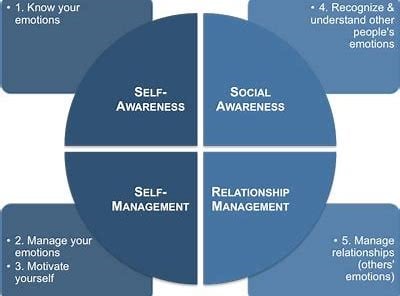Introduction
We all have a ‘toolkit’ to draw on as we seek to be the best we can be at work. In recent years a person’s emotional intelligence helps to increase our efficiency and productivity. It underpins the ‘how’ we do things in terms of the approach.
In this post we’ll provide more detail around emotional intelligence and provide specific examples of how we can use it to improve performance.
What is emotional intelligence?
Emotional Intelligence refers to a person’s capacity to be aware of their emotions. It also allows a person to handle their interpersonal relationships fairly and sensibly.
A lot of research has taken place on the topic of emotional intelligence and therefore a number of ways it has been described. According to Daniel Goleman, an American psychologist who helped to popularise emotional intelligence, there are four key domains to it:
Self-Awareness: This can be defined as having the ability to recognize one’s own emotions. Also their strengths, weaknesses, values and drivers and understanding their impact on others.
Self-Management: Also known as discipline. This involves controlling or redirecting our disruptive emotions. It also controls our adapting to change circumstances in order to keep relationships moving forward.
Empathy: Empathy is the ability to put yourself in someone else’s shoes and understand how they may feel or react.
Social Skills/Relationship Management: Those who do well in the social skills element of emotional intelligence are great communicators. They are as open to delivering, or hearing, bad news as they would be when the news is more positive.
You can watch a short video of Daniel Goleman describing the four domains of emotional intelligence.
How to use EMOTIONAL INTELLIGENCE TO INCREASE EFFECTIVENESS AT WORK?
If we’re self- aware we know in advance how any actions are likely to affect our emotions and those of our colleagues. This helps us to take a better, more rounded, approach when it comes to our work and, ultimately increase our productivity.
An example of this might be that if we have awareness of how the emotions that working with ambiguity create behaviours in ourselves. These have a negative impact on colleagues, therefore we can take steps to remove the ambiguity, as much as possible.
Every workplace has moments where tensions are raised. Often this can cause strong emotions which can lead to behaviours which are not healthy. Being able to use self-management means we can keep a check on these behaviours and stay in control.
If you can display empathy you will be able to put yourself in someone else’s position. You will understand how this translates into maximising their productivity and ensuring wellbeing is maintained.
A good level of social skills/relationship management increases our efficiency in things like employee engagement and conflict resolution.
To summarise
EMOTIONAL INTELLIGENCE TO INCREASE EFFECTIVENESS AT WORK is what enables us to be aware of, control and express their emotions, and to handle interpersonal relationships fairly and sensibly.
Each of the four domains provide opportunities to become more effective in the use of our emotional intelligence. Statistics available show that working on this can provide success:
The source of this information is TalentSmart.
- Emotional Intelligence is responsible for 58% of your job performance.
- 90% of high performers have high emotional intelligence.
- 71% of hiring managers believe emotional intelligence (EI) is more important
